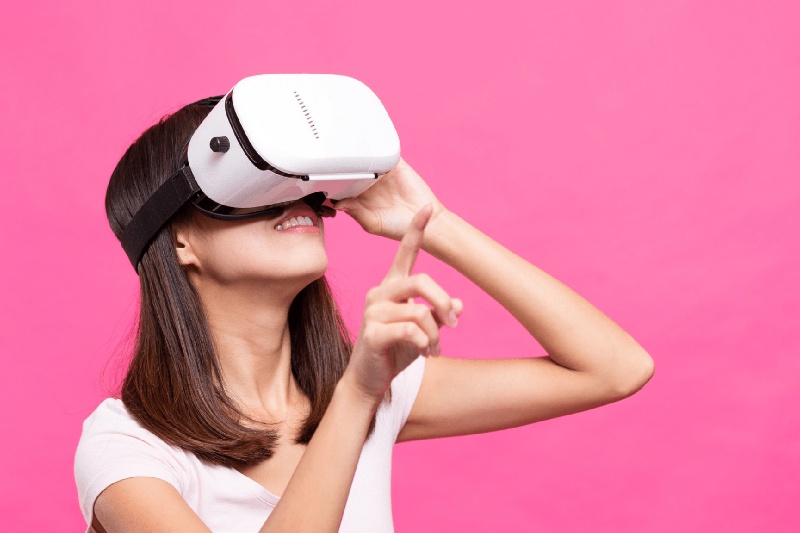Lately, we’ve been hearing a lot more about the metaverse, but for many, the concept is still somewhat shrouded in mystery. What we do know is that it has the potential to completely change the way we work, communicate and live our daily lives, and in the context of localisation, could lead to a new development known as cosmolocalisation.
In this article, we explore how the metaverse could change localisation, primarily looking at the potential impact and practical implications of cosmolocalisation.
What is the metaverse?
The metaverse does not refer to any one specific type of technology, but rather a shift in how we interact with technologies such as virtual reality (VR), augmented reality (VR), 4D audio, and eye-tracking.
In the metaverse, all of these technologies work together to create a virtual universe that can be experienced simultaneously by an unlimited number of users all over the world.
In this new digital economy, users can create, buy and sell goods, as well as meet people, host gatherings and participate in virtual events.
We are already seeing the emergence of self-contained metaverses in online gaming platforms such as Roblox and Minecraft. However, in ‘the’ metaverse, all of these individual metaverses will be part of an infinite, seamless, interlinked whole.
What is cosmolocalisation?
Cosmolocalisation — also referred to as ‘design global, manufacture local’ (DGML) — involves bringing together our globally distributed knowledge and design commons with the capacity for localised production across a range of material goods.
DGML is a growing movement that champions globally-sourced designs for local economic activity, following the logic that what is light (i.e. knowledge, software and design) becomes global, while what is heavy (i.e. manufacturing and production) becomes local.
Vangelis Lympouridis is a specialist in Innovation by Design, Design Thinking, Immersive Virtual Reality and Augmented Reality (XR) technologies. He explains cosmolocalisation as a ‘fusion of technology, political science, philosophy and economics.’
It brings together ‘direct access to worldwide content, knowledge, and experiences with context awareness and a local production or facilitation of this knowledge to produce new content, services, and experiences.’
A new localised reality inside the metaverse
Mark Zuckerberg, CEO of Meta (formerly Facebook) envisions a world where language barriers are a thing of the past thanks to highly advanced embedded translation capabilities.
Within the metaverse, users would be able to communicate across any language and in real-time, opening up incredible possibilities for people all over the world to connect and collaborate.
According to Zuckerberg, ‘if we get this right, this is just one example of how AI can help bring people together on a global scale.’
Of course, the true localisation of any content or experience involves a variety of cultural and contextual factors, not just the translation from one language into another. As more advanced technologies and systems continue to shape the metaverse, it may be possible to localise shared virtual environments at some point in the not-too-distant future.
This would mean that users experience the environment differently depending on their individual cultural expectations and preferences. Content and experiences can be tailored to the individuals that access them, while real-time communication and interaction are enabled by seamless translation capabilities.
Practical implications
Cosmolocalisation has the potential to lead to more sustainable and inclusive forms of production and consumption, building on the convergence of digital commons and local manufacturing technologies. For example, decentralised open design resources can be used for the local manufacturing of tools, pharmaceuticals, prosthetic limbs, furniture, machinery and much more.
Here are a few examples that illustrate the practical implications of cosmolocalisation:
1. Cosmolocalisation – Prosthetics
A prosthetic limb is designed by a geographically dispersed team of scientists and experts, and the knowledge, software and designs are then shared globally as a commonly accessed digital asset. Then, other people around the world who have access to local manufacturing machines can produce their own customised prosthetic limbs. There are no patent costs to pay for and less transportation of materials since much of the manufacturing takes place locally.
2. Cosmolocalisation – Agriculture
A group of small-scale farmers struggle to source machinery that accommodates their needs, so they decide to design some themselves. They share their designs globally as a digital commons, which other small-scale farmers around the world can use to create their own custom machinery.
These examples are just the tip of the iceberg when it comes to the possibilities presented by cosmolocalisation and the metaverse.
What does this mean for localisation professionals?
Opportunity.
With concepts like the metaverse and cosmolocalisation being seriously worked on for the first time, their likelihood of actually being realised in the near future is higher than ever.
What this means for localisation professionals is that there will be a steadily growing number of opportunities for work and career advancement across an incredibly diverse range of areas.
While this is great for the average LSP, many of these opportunities will be quite technical in nature. It will most likely be those who have a strong understanding of the technologies involved, their creators, and their potential applications that will be able to identify the most interesting and lucrative opportunities – particularly in the early days.
If you haven’t already, it might be time to start delving into the realm of artificial intelligence, virtual reality and eye-tracking technologies to start to get a clearer picture of just where your efforts might be needed most in the decade to come.
Your localisation recruitment agency
As new technologies and approaches continue to shape the localisation industry, International Achievers Group will always strive to remain at the forefront of trends and developments, so check out our blog and resources to keep your company one step ahead.
With over 20 years of experience, International Achievers Group specialises purely in localisation recruitment. We know that people are what make great companies, and we pride ourselves on matching the best localisation professionals with the top employers across the world.
For expert advice and career guidance, get in touch with our team today.




